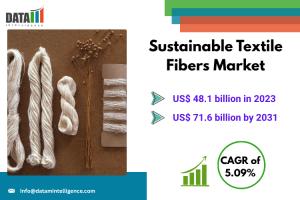Sustainable Textile Fibers Industry Growth Driven by Eco Trends, Green Tech, and Circular Fashion | DataMIntelligence
The sustainable textile fibers market is growing steadily, fueled by green innovations, eco-conscious brands, and shifting consumer preferences.
Textile sustainability isn’t just a trend it’s a transformation. Eco-fibers are redefining fashion’s future with transparency, innovation, and responsibility at the core.”
NEW YORK, NY, UNITED STATES, July 21, 2025 /EINPresswire.com/ -- Market Overview— DataM Intelligence
The Sustainable Textile Fibers Market has witnessed a transformative surge, catalyzed by the global momentum toward eco-conscious lifestyles and ethical fashion practices. Valued at US$ 48.15 billion in 2023, the market is projected to reach US$ 71.65 billion by 2031, growing at a CAGR of 5.09% during the forecast period (2024–2031).
The rise is driven by heightened environmental concerns, stringent global regulations, and the growing demand for biodegradable and renewable fiber sources. From fiber producers to global fashion brands, all stakeholders are increasingly aligning with sustainability targets, adopting traceable supply chains, and investing in green technology innovations.
Download Latest Sample Pdf : https://www.datamintelligence.com/download-sample/sustainable-textile-fibers-market
Sustainable Textile fibers Market Drivers are :
Growing Environmental Awareness
Consumers and industries alike are shifting away from petroleum-based synthetics. The environmental impact of fast fashion, including carbon emissions, microplastic pollution, and water-intensive processes, has accelerated the adoption of natural and recycled fibers.
Supportive Government Regulations
Policies from regions such as the European Union, Japan, and the United States are fostering circular practices. Bans on single-use plastics and incentives for biodegradable textiles are reshaping sourcing strategies across the fashion and industrial textile sectors.
Surging Demand from Apparel Brands
Major fashion labels such as H&M, Patagonia, Levi’s, and Adidas are integrating sustainable fibers to meet ESG goals and to appeal to eco-conscious consumers. Certifications like GOTS, OEKO-TEX®, and Cradle to Cradle are becoming industry benchmarks.
Technological Advancements
Innovations in fiber processing, closed-loop recycling systems, enzyme-based dyeing, and bio-fabrication are enabling cost-effective, high-performance green textiles.
Rise of Circular Economy Models
Brands and recyclers are investing in take-back programs, chemical recycling, and fiber regeneration technologies, which promote textile-to-textile recycling and reduce landfill waste.
Shift in Consumer Behavior
Millennials and Gen Z, who are more socially and environmentally aware, are demanding transparency and ethical sourcing, favoring brands that offer sustainable alternatives and low-impact production methods.
Sustainable Textile fibers market Key Players are :
Lenzing AG
US Fibers
Grasim Industries Ltd.
Shanghai Tenbro Bamboo Textile Co. Ltd.
China Bambro Textile (Group) Co., Ltd.
Pilipinas Ecofiber Corporation
Teijin Limited
Foss Performance Materials
BASF
Södra
These companies are spearheading sustainable innovations, ranging from bamboo-based fabrics and bio-refined additives to viscose with closed-loop systems, and regenerated cellulose technologies.
Market Segmentation
By Fiber Type:
Organic Cotton
Hemp
Bamboo
Tencel (Lyocell)
Recycled Polyester
Others (e.g., Banana Fiber, Ramie, Coir)
By Application:
Apparel
Home Textiles
Industrial
Medical
Automotive
By Distribution Channel:
Direct Sales (B2B)
Retail Stores
E-commerce Platforms
By Region:
North America
Europe
Asia-Pacific
South America
Middle East & Africa
Latest News – USA (2025)
US Fibers, in July 2025, announced a 25% expansion in its South Carolina plant, aimed at producing high-purity recycled polyester fibers tailored for automotive and apparel sectors.
The U.S. Department of Energy rolled out a $30 million grant program supporting sustainable fiber startups and low-impact dyeing technologies.
New trade incentives announced in June 2025 encourage the import of biodegradable fiber technologies, signaling policy support for the green fashion transition.
Latest News – Japan (2025)
In July 2025, Teijin Limited launched its new initiative BioLoop, a project focusing on 100% plant-derived polyester using carbon-neutral production.
Japan’s Ministry of Economy, Trade and Industry (METI) unveiled a comprehensive national textile strategy aiming for net-zero emissions across the textile sector by 2045, with a strong emphasis on financial support for cellulose-based fiber innovations.
Tokyo Fashion Week 2025 collaborated with circular fashion brands to showcase a fully sustainable runway collection, spotlighting materials such as TENCEL, hemp, and recycled silk.
Most Recent Key Developments (2025)
June 2025 – Lenzing AG entered a strategic partnership with a European retailer to co-develop biodegradable apparel collections using TENCEL™ fibers.
May 2025 – BASF introduced a next-generation bio-based additive improving colorfastness and performance in plant-derived textiles.
April 2025 – Grasim Industries Ltd. expanded its green viscose capacity using zero-liquid discharge (ZLD) technology and renewable energy integration.
March 2025 – Södra unveiled FiberLoop, a platform that blends wood cellulose with post-consumer textiles, enhancing quality and scalability of recycled yarns.
February 2025 – Shanghai Tenbro Bamboo Textile Co. collaborated with a Nordic performance brand to create antibacterial, moisture-wicking bamboo activewear.
Conclusion :
The sustainable textile fibers market is undergoing a paradigm shift. Driven by collective action from governments, industries, and consumers, the path to a circular and transparent fashion economy is taking shape. Challenges such as scaling innovations and reducing costs still exist, but collaborative strategies and technological breakthroughs are offering long-term solutions.
As eco-textiles become the norm rather than the niche, the focus is sharpening on traceability, lifecycle impact, and cross-sector sustainability integration. The future of fashion is not only stylish it’s circular, ethical, and regenerative.
Purchase Your Subscription to Power Your Strategy with Precision: https://www.datamintelligence.com/reports-subscription
Browse More Reports :
Polyimide Tapes (PI Tapes) Market
Polyimide Film Market
Sai Kumar
DataM Intelligence 4market Research LLP
+1 877-441-4866
email us here
Visit us on social media:
LinkedIn
X
Legal Disclaimer:
EIN Presswire provides this news content "as is" without warranty of any kind. We do not accept any responsibility or liability for the accuracy, content, images, videos, licenses, completeness, legality, or reliability of the information contained in this article. If you have any complaints or copyright issues related to this article, kindly contact the author above.

